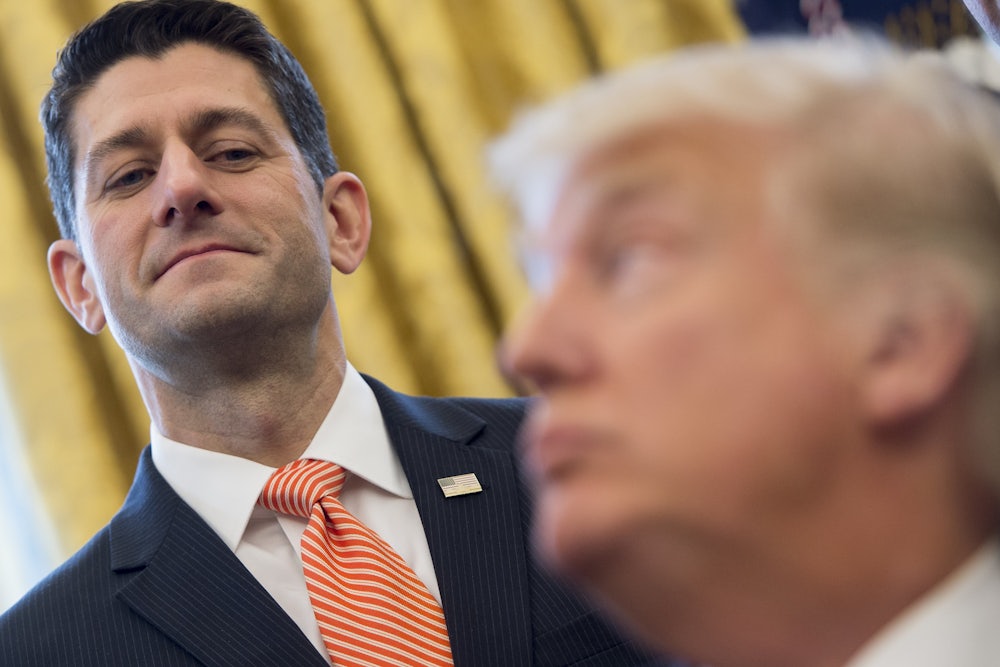We are now well into a phase of the Trump-Russia collusion scandal where denials are giving way to ridiculous and in many ways contradictory forms of spin and excuse-making.
The Trump-loyalist account of the emerging conspiracy is that there’s no proof that it happened, but if it did, it was legal—and in any case it was a setup. President Donald Trump’s own attorney, the hucksterish movement-conservative lawyer Jay Sekulow, test drove a new and obviously bogus argument on Sunday morning that if the collusion was bad, it’s the Secret Service’s fault for not saving the Trump campaign from itself.
It should be simple enough to defend the status quo ante, when teaming up with hostile foreign intelligence services to wage a political campaign against an American opponent was essentially unimaginable. But only a handful of Republican members of Congress can muster such a defense today. Faced with the easiest question in the world, House Speaker Paul Ryan deployed this cowardly dodge:
Asked if he'd take meeting with foreign source offering campaign info, @SpeakerRyan says "I'm not going to go into hypotheticals." pic.twitter.com/ONemfDJsYJ
— ABC News Politics (@ABCPolitics) July 12, 2017
Republicans like Ryan, who ghoulishly exploited the deaths of Americans in Benghazi, know better than anyone that there’s more to political good behavior than staying within the bounds of criminal law. The GOP’s determination to see no evil in Trump’s conduct foreshadows a horrifying future in which at least one party can team up with whomever they want, so long as the goal is to defeat a domestic political opponent.
“As someone who’s run for office five times, if the devil called me and said he wanted to set up a meeting to give me opposition research on my opponent,” Judge Jeanine Pirro, the maniacal Fox News host, said on Sunday. “I’d be on the first trolley to hell to get it. And any politician who tells you otherwise is a bald-faced liar.” She added that “there is no law that says a campaign cannot accept information from a foreign government.”
Imagine for a moment that she is correct, and nobody in the Trump organization—in all their skating outside ethical lines—committed a crime. No conspiracy, no election-law violation, no misprision of a felony.
These apologetics are wicked precisely because they erase the moral dimension of the Trump campaign’s wrongdoing. The “technically legal” excuse is no more of an excuse now than it was when Al Gore claimed “no controlling legal authority” prevented him from making fundraising phone calls from the White House, but it is an attempt to normalize something far more grotesque than campaigning with taxpayer-funded resources.
These differences don’t exist only in the eye of the beholder. The idea that a foreign power might help select a president was such an alarming thought to the founders of the United States that they designed the election system in part to guard against what has just come to pass. Alexander Hamilton specifically warned that the “most deadly adversaries of republican government might naturally have been expected to make their approaches from more than one quarter, but chiefly from the desire in foreign powers to gain an improper ascendant in our councils.”
“How could they better gratify this,” he asked, “than by raising a creature of their own to the chief magistracy of the Union?”
These concerns quite manifestly don’t rate as highly with Republicans as the notion that high-income earners might someday pay higher taxes.
Last week, the chairman of the Democratic Congressional Campaign Committee Ray Lujan wrote a letter to his Republican counterpart, Steve Stivers, asking him to form a alliance with Democrats against further Russian subversion of the U.S. election system. “Specifically,” Lujan wrote, “I ask that we convene in the near future to discuss how to best establish a united front against foreign governments and collaborate with DHS, the FBI, and other institutions to protect our elections.”
There was no doubt a political angle to Lujan’s letter. The purpose in releasing it publicly was to exploit the tension between GOP claims to patriotic duty and the fact that the interference in the last election helped them. But Lujan’s actual request was eminently reasonable, and this weekend Stivers rejected it.
There is nothing hypothetical about Lujan’s concerns. Lost in all the commotion around the Trump campaign’s participation in Russia’s subversion efforts is the fact that those efforts weren’t limited to the presidential election, and the bad deeds weren’t limited to Trump and his advisers. The DCCC was among the institutions that Russian intelligence hacked. At least one Republican operative requested and received 2.5 gigabytes worth of documents from that hack, and effectively weaponized the information. Among the beneficiaries of the mass theft was Paul Ryan, whose super PAC used the leaked material to attack Democrats.
Whether it’s correct or not, the argument that nothing the Trump campaign did violated federal law ignores the fact that if an American super PAC did what the Russian intelligence services did, its proprietors would be guilty of many serious crimes, and it would’ve been illegal for campaigns to coordinate activities with them. We know it was wrong, because we have laws designed to prevent it in fully domestic contexts. Yet Republicans and Trump are fast becoming of one mind that the Russian subversion campaign was useful, and they hope it happens again.
